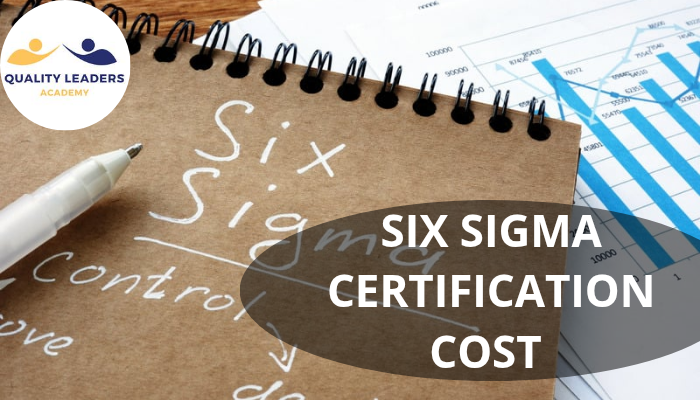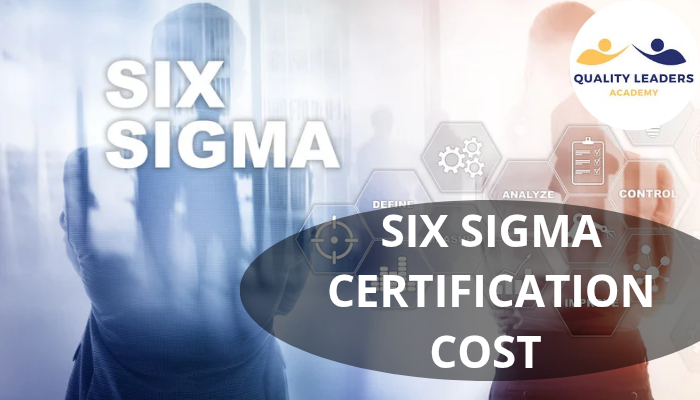In today’s healthcare landscape, process efficiency and quality improvement are more critical than ever. Lean Six Sigma certification cost is a key consideration for medical professionals looking to enhance patient care, reduce operational waste, and advance their careers. With certification options ranging from White Belt to Master Black Belt, the investment varies based on factors such as training providers, course format, and study materials. In this article, we will explore the cost variations, factors influencing pricing, and why Quality Leaders Academy stands out as a reliable and cost-effective choice for healthcare professionals.
UNDERSTANDING SIX SIGMA CERTIFICATION LEVELS IN HEALTHCARE

Six Sigma offers different certification levels, each catering to varying expertise and responsibilities in process improvement. The most relevant certifications for healthcare providers include:
- White Belt: Provides a basic understanding of Six Sigma principles.
- Yellow Belt: Focuses on supporting Six Sigma projects and assisting teams.
- Green Belt: Equips professionals with process improvement skills to lead small projects.
- Black Belt: Advanced level for leading complex projects and training teams.
- Master Black Belt: Highest certification, responsible for enterprise-wide strategy and training.
Since healthcare organizations deal with patient safety, compliance, and process optimization, the Green Belt and Black Belt certifications are the most sought-after levels for healthcare professionals.
FACTORS INFLUENCING THE COST OF SIX SIGMA CERTIFICATION
The cost of Six Sigma certification depends on multiple factors, including:
1. Training Provider
Different training providers offer Six Sigma courses at varying prices. Universities, private institutions, and online platforms each have unique pricing structures based on course depth, study materials, and instructor expertise.
2. Course Format (Online vs. In-Person)
- Online Courses: More affordable and flexible, allowing healthcare professionals to learn at their own pace.
- In-Person Training: Generally more expensive due to classroom settings, hands-on exercises, and direct mentorship.
3. Study Materials and Exam Fees
Some certifications include study materials and exam fees in their package, while others charge separately. Additional costs may apply for textbooks, software tools, and case studies relevant to healthcare applications.
4. Certification Body and Accreditation
Different organizations, such as ASQ (American Society for Quality), IASSC (International Association for Six Sigma Certification), and CSSC (Council for Six Sigma Certification), set their own pricing standards. Choosing a reputable accreditation ensures the certification is widely recognized.
5. Healthcare-Specific Training
Some Six Sigma programs are tailored specifically for the healthcare sector, including case studies, real-world hospital scenarios, and compliance-focused training. These specialized programs may be priced differently compared to general Six Sigma courses.
VARIATION IN SIX SIGMA CERTIFICATION COSTS
Due to these factors, Six Sigma certification costs vary across locations and providers. While some institutions offer budget-friendly online courses, others provide premium training with extensive mentorship and real-world applications, here’s a general breakdown:
- Entry-Level Certifications (White and Yellow Belt): These are more affordable and require fewer training hours.
- Mid-Level Certifications (Green Belt): Costs vary based on training depth and exam fees.
- Advanced Certifications (Black Belt and Master Black Belt): Higher costs due to comprehensive coursework, project requirements, and expert-level training.
Healthcare professionals should choose a program that balances affordability, accreditation, and relevance to healthcare settings.
WHY CHOOSE QUALITY LEADERS ACADEMY FOR SIX SIGMA CERTIFICATION?
When looking for a reliable and cost-effective Six Sigma certification program, Quality Leaders Academy is a strong recommendation. Their courses offer:
- Comprehensive training tailored to healthcare professionals.
- Flexible learning formats, including online and in-person options.
- Accredited certification recognized internationally.
- Reasonable pricing compared to other institutions, makes it a smart investment for career growth.
Focusing on real-world applications in the healthcare sector, Quality Leaders Academy provides a structured and practical approach to Six Sigma certification.
ADDITIONAL BENEFITS OF SIX SIGMA CERTIFICATION IN HEALTHCARE

Beyond cost considerations, obtaining a Six Sigma certification brings numerous advantages to healthcare professionals:
1. Improved Patient Safety and Quality of Care
Six Sigma methodologies help reduce errors in diagnosis, medication administration, and surgical procedures, ensuring better patient outcomes.
2. Increased Career Opportunities
Certified healthcare professionals are in high demand for roles in hospital administration, quality management, and healthcare consulting.
3. Operational Efficiency and Cost Reduction
Hospitals and clinics can minimize waste, streamline workflows, and enhance resource utilization, leading to significant cost savings.
4. Stronger Compliance and Accreditation Readiness
Six Sigma training helps healthcare providers meet industry regulations and accreditation standards such as JCI, CBAHI, and ISO 9001.
5. Enhanced Professional Recognition
Holding a Six Sigma certification demonstrates expertise in process improvement, making professionals stand out in the healthcare field.
Six Sigma certification cost may be high on some levels, but it is a valuable investment for healthcare professionals who want to enhance patient care, improve hospital processes, and advance their careers. While certification costs vary depending on the training provider, course format, and accreditation, choosing the right program ensures a high return on investment.
Before enrolling in any Six Sigma program, it's essential to compare providers, assess course content, and ensure accreditation to make an informed decision that aligns with your professional goals.
Resources:
https://www.sixsigmaonline.org/six-sigma-certification-in-healthcare
https://www.simplilearn.com/six-sigma-certification-cost-article
https://www.indeed.com/career-advice/career-development/certification-in-six-sigma-healthcare


